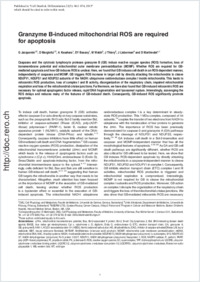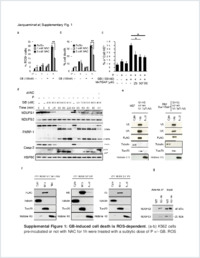Granzyme B-induced mitochondrial ROS are required for apoptosis
- Jacquemin, G. CMU, Cell Physiology and Metabolism, Faculté de Médecine, Université de Genève, Switzerland
- Margiotta, D. CMU, Cell Physiology and Metabolism, Faculté de Médecine, Université de Genève, Switzerland
- Kasahara, A. CMU, Cell Physiology and Metabolism, Faculté de Médecine, Université de Genève, Switzerland
- Bassoy, E. Y. CMU, Cell Physiology and Metabolism, Faculté de Médecine, Université de Genève, Switzerland
- Walch, Michael Unité d’Anatomie, Departement de Médecine, Université de Fribourg, Switzerland
- Thiery, J. INSERM U753, Gustave Roussy Cancer Campus, Villejuif, France
- Lieberman, J. Program in Cellular and Molecular Medicine, Boston Children’s Hospital, Harvard Medical School, Boston, MA, USA
- Martinvalet, Denis CMU, Cell Physiology and Metabolism, Faculté de Médecine, Université de Genève, Switzerland
-
01.04.2015
Published in:
- Cell Death & Differentiation. - 2015, vol. 22, no. 5, p. 862–874
English
Caspases and the cytotoxic lymphocyte protease granzyme B (GB) induce reactive oxygen species (ROS) formation, loss of transmembrane potential and mitochondrial outer membrane permeabilization (MOMP). Whether ROS are required for GB-mediated apoptosis and how GB induces ROS is unclear. Here, we found that GB induces cell death in an ROS-dependent manner, independently of caspases and MOMP. GB triggers ROS increase in target cell by directly attacking the mitochondria to cleave NDUFV1, NDUFS1 and NDUFS2 subunits of the NADH: ubiquinone oxidoreductase complex I inside mitochondria. This leads to mitocentric ROS production, loss of complex I and III activity, disorganization of the respiratory chain, impaired mitochondrial respiration and loss of the mitochondrial cristae junctions. Furthermore, we have also found that GB-induced mitocentric ROS are necessary for optimal apoptogenic factor release, rapid DNA fragmentation and lysosomal rupture. Interestingly, scavenging the ROS delays and reduces many of the features of GB-induced death. Consequently, GB-induced ROS significantly promote apoptosis.
- Faculty
- Faculté des sciences et de médecine
- Department
- Département de Médecine
- Language
-
- English
- Classification
- Biological sciences
- License
- License undefined
- Identifiers
-
- RERO DOC 255910
- DOI 10.1038/cdd.2014.180
- Persistent URL
- https://folia.unifr.ch/unifr/documents/304251
Other files
Statistics
Document views: 54
File downloads:
- wal_gbi.pdf: 203
- wal_gbi_sm.pdf: 115

